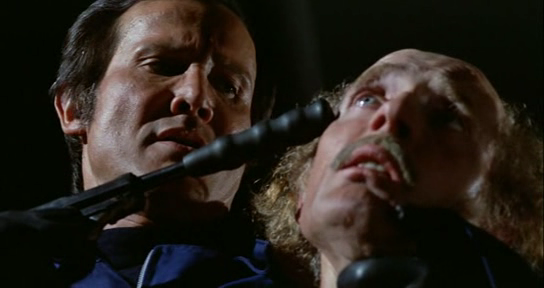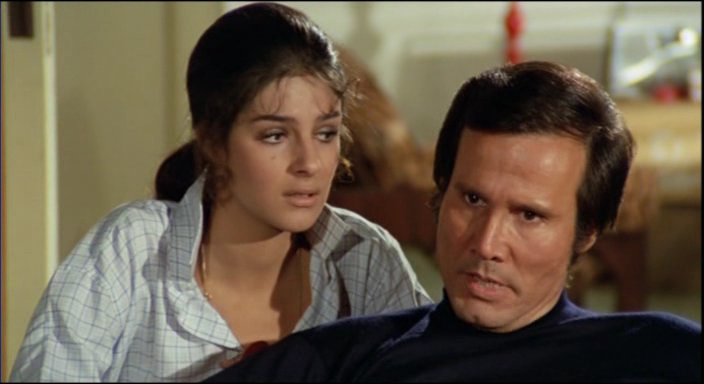
Il Boss
Italy, 1973
Director: Fernando Di Leo
Script: Fernando Di Leo (based on a novel by Peter McCurtin)
Cast: Henry Silva (Lanzetta), Richard Conte (Don Corrasco), Gianni Garko (Commissar Torri), Antonia Santilli (Rina D’Aniello), Corrado Gaipa (Rizzo), Marino Masé (Pignataro), Claudio Nicastro (Giuseppe D’Aniello), Vittorio Caprioli (Police Chief), Pier Paolo Capponi (Cocchi)
Music: Luis E. Bacalov
Plot
In Palermo, hitman Nick Lanzetta enters a cinema during a private session in which members of Antonino Attardi’s mafia group are about to watch a Danish erotic film. Lanzetta, acting on behalf of Don Giuseppe D’Aniello (Attardi’s rival) massacres everyone present from the projection booth by shooting them with a grenade launcher.
The 10 semi-carbonized and unrecognizable bodies end up in the morgue, where Carlo Attardi, brother of the murdered boss, swears revenge.
D’Aniello ordered the settling of scores because Attardi had brought into his organization Cocchi, an assassin in the pay of the Calabrian ‘Ndrangheta suspected of being an infiltrator who sells information to the anti-Mafia commission while trying to become a member of the Cosa Nostra…
Inspector Torri, who is in charge of investigating the attack, meets Cocchi, who discovers that Cocchi plans to form a group of hitmen with Attardi’s brother to take revenge on D’Aniello. Torri, who has contacts at the top of the Cosa Nostra, then warns Don Corrasco of the Calabrian’s plans. Don Corrasco is the boss of bosses of the Mafia in Sicily (he is “il Boss” to which the title refers).
Cocchi therefore implements his revenge and has Rina, the young and attractive daughter of D’Aniello, kidnapped. The Calabrian wants D’Aniello to give himself up in exchange for his daughter’s life. The father is ready to accept, but Don Corrasco tells him not to be too hasty, because he will look for a solution to the dilemma without having to give in to blackmail: Don Corrasco entrusts Lanzetta, the best of his men and author of the cinema massacre, with the mission of rescuing Rina and eliminating Cocchi. At the same time, Don Corrasco also warns Lanzetta to keep an eye on D’Aniello, to prevent him from trying to take action on his own (as he had suggested paying a large ransom, which would be interpreted by the enemy as a sign of weakness).
Faced with this situation of potential clan warfare, lawyer Rizzo sets out to arbitrate as a mediator. Rizzo is the link between the State and the Mafia; he lets D’Aniello and Corrasco know the dispositions of the highest authorities, the politicians from Rome – who do not like the convulsive situation of violence in the streets in Sicily and who want to see “order” restored. Rizzo therefore advised Don Corrasco to make peace with what is left of the Attardi family and with Cocchi, integrating them into his organization. But Corrasco does not give in; “Cocchi either goes back to Calabria or goes to the other world”.
Commissar Torri’s connections with the supreme leader of the Mafia threaten to come to light. Magistrates and officials are aware that the corrupt policeman is on Don Corrasco’s payroll, but nothing is being done from the “top” to remove him from office or at least to transfer him.
While the distressed Giuseppe D’Aniello worries about his abducted daughter and fears she is being raped and tortured, Rina has a great time with her kidnappers: she is a lascivious nymphomaniac who gladly sleeps with all of them.
D’Aniello wants to get his daughter back safe and sound as soon as possible, regardless of the orders not to negotiate given by Don Corrasco. So he calls his right arm and Lanzetta, the best of his gunmen, to arrange with Cocchi and his gang the payment of a large ransom. Lanzetta now struggles between loyalty to D’Aniello, who has been like a father to him; and obedience to the boss of bosses Don Corrasco .
Just as Lanzetta has grown up in the shadow of Don Giuseppe D’Aniello, the ambitious Pignataro is Don Corrasco’s protégé. Lanzetta and Pignataro will be in a position to forge an alliance.
The uncontrolled violence that those who hold real power wanted to avoid is only increasing. Lawyer Rizzo visits Don Corrasco to put pressure on him: Once again he insists that he must accept Cocchi into his organization – unless he manages to make him disappear in the course of days (Rizzo emphasizes the word “disappear,” that is, he wants to prevent a body from being found). Don Corrasco, the top leader of Cosa Nostra (the “capo di tutti capi”, “il Boss”), must take orders from “above” if he wants to keep his share of power. It’s about putting an end to the open warfare in the streets, to the shootings and to the spectacular butcheries like the grenade attacks in the cinema… because all that attracts too much attention. The powerful know that “explosive” reckoning (in both the figurative and the literal sense) must be properly dosed. It is more comfortable to pull the strings discreetly in “peacetime”.
Rizzo insists that, if Corrasco is unable to quietly finish off Cocchi, he should integrate him into his “family”, as he had demanded from the beginning. The big boss of the Mafia, who nevertheless knows that Cocchi is an agent destined to subvert and disrupt his clan, asks Rizzo for a week to annihilate the uncomfortable Calabrian…
Once again, this will have to be done by the circumspect and efficient Lanzetta – who, thanks to Pignataro’s collaboration, has already managed to free the libertine Rina.
But as killing Cocchi without further bloodshed will prove to be an impossible task, Don Corrasco begins to rethink certain priorities, and decides to give up his faithful Lanzetta to entrap him with the crimes that are shaking Palermo. The person in charge of setting a trap for Lanzetta and killing him “in self-defense” must be another henchman in Corrasco’s pay: Commissar Torri…

Commentary
More than a common polizziesco, this is an intense thriller set in the context of the Sicilian Mafia and full of political connotations. Here Di Leo returns more broadly to a theme that he had already touched on concisely the previous year in “Milano calibro 9” (1972) through the mouth of vice-commissioner Mercuri: Far above the regular Mafia boss there are always much more powerful people, who are the ones who really pull the strings and give the orders – these individuals, who hide behind a mask of respectability, are not the politicians known to the “ordinary citizen” who appear in the newspapers either, but others who move behind the scenes with much more secrecy.
Fernando Di Leo was one of the very few directors (and probably the first) who dared to approach the Italian polizziesque and gangster genre from that perspective; together with Damiano Damiani (“Io ho paura”, 1977) and the directors of the mini-series saga “La Piovra” (1984-2001).
“Il Boss” is the third film of Fernando Di Leo’s “Trilogia della Mala” with “Milano calibro 9” (1972) and “La mala ordina” (1972). Like “The Godfather” it is based on a novel, and “Il Boss” contains all the ingredients that a thrilling story about the Mafia must have: clever strategies, tactical alliances (which soon break down), double standards, settling of scores, struggle for power, pacts, betrayals… (i.e. real politics – in the most Machiavellian sense of the word).
It is striking that several of the secondary characters appear in the three films of the trilogy in different roles. For example, one of the couriers in the opening scene of “Milano calibro 9” is a thug from Tressoldi in “La mala ordina” and a policeman from Inspector Torri in “Il Boss”. Also another curious detail: Don Vito Tressoldi uses in “La mala ordina” the same crucifix-ashtray that Don Corrasco has in his office.
Puerto Rican Henry Silva (one of the main characters in “La mala ordina”) plays the icy and efficient hitman Lanzetta, an individual who is as tough as nails. Don Corrasco is played by Italian-American actor Richard Conte, who in “The Godfather” (F.F. Coppola, 1972), a year earlier, played Don Emilio Barzini, Don Vito Corleone’s fiercest rival. Also in “The Godfather”, Corrado Gaipa appears as the mafia boss who gives shelter to Michael in Sicily. In “Il Boss”, Corrado Gaipa is the lawyer Rizzo. Commissioner Torri is played by the Italian-Croatian Gianni Garko, the protagonist of the excellent Gothic horror film “The Night of the Devils” (Giorgio Ferroni, 1972). In the role of Pignataro is Marino Masé, who can be seen in “Kidnap Syndicate” (1975), another highly recommended polizziesco film by Di Leo; or in “Baciamo le mani” (Vittorio Schiraldi, 1973), also a film with a mafia theme.
The vicious Rina, who has no shame, almost deserves a separate chapter. Her father, Don Giuseppe D’Aniello, has her idealized as an innocent and naive little angelic princess. It is almost comical to see the efforts that the poor man makes to rescue her; considering that she, a “drug addict nymphomaniac” (as Lanzetta will later call her), just enjoys herself during her kidnapping…
The capricious and spoiled young woman is played by the beautiful Antonia Santilli, who was Ornella Muti’s double in the hottest scenes of her films in those years; and who had supporting roles in several “commedie sexy all’italiana” (a kind of softcore-erotic comedies) with titles such as “Decameroticus”, “Il mio corpo con rabbia” (“My body with anger”) or “Ancora una volta prima di lasciarci” (“Once more before we leave”). Antonia Santilli also participated in 1974 in an Italian-Russian co-production shot in the Soviet Union and entitled “Incredible adventures of Italians in Russia” (co-directed by Franco Prosperi, director of the rape&revenge “La settima donna” or the barbarian-exploitation “Gunan the warrior” and “Throne of fire”).
The soundtrack of “Il Boss” was once again directed by Luis E. Bacalov (a regular contributor to Di Leo). Although it does not reach the very high level of the music of “Milano Calibro 9”, it is quite better than that of “La mala ordina”, and at times it even has some slight Western reminiscences (Italian-Western, of course).
Get Mafia Films: A Guide HERE!
Get Il Boss HERE!
Get Fernando Di Leo Crime Collection 4-Disc Box Set HERE!
(These are affiliate links. I may earn a commission if you purchase through these links, at no extra cost to you. As an Amazon Associate, I earn from qualifying purchases.)
